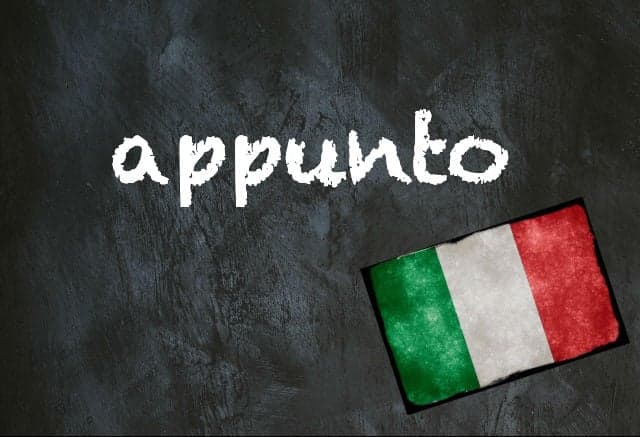Italian word of the day: 'Appunto'

You might find this is just the word you're looking for.
How do you tell someone they've got it just right – not near enough, or in the ball park, but spot on?
Appunto is the word you need. It means 'exactly' or 'precisely'.
La cosa è andata appunto così.
That's precisely how it went.
Appunto per questo ti ho fatto venire.
That's exactly why I got you to come.
It's often used to show that something or someone has shown up at just the right time.
Appunto, volevo proprio te.
You're the very person I wanted to see.
Si parlava appunto di questo.
We were talking about that very thing.
You can also use appunto to answer a question in the affirmative – like giving a very emphatic 'yes!' or 'indeed!'
– Mi aspettavi?
– Appunto!
– Were you waiting for me?
– Indeed I was!
That's how you use appunto as an adverb, but don't mix it up with the identical noun.
Un appunto is a 'critique' or 'objection', while its plural form – gli appunti – means 'notes'.
Ho dimenticato di prendere appunti.
I forgot to take notes.
Ho un appunto da farti.
I have an objection to make.
Do you have a favourite Italian word you'd like us to feature? If so, please email us with your suggestion.
Comments (2)
See Also
How do you tell someone they've got it just right – not near enough, or in the ball park, but spot on?
Appunto is the word you need. It means 'exactly' or 'precisely'.
La cosa è andata appunto così.
That's precisely how it went.
Appunto per questo ti ho fatto venire.
That's exactly why I got you to come.
It's often used to show that something or someone has shown up at just the right time.
Appunto, volevo proprio te.
You're the very person I wanted to see.
Si parlava appunto di questo.
We were talking about that very thing.
You can also use appunto to answer a question in the affirmative – like giving a very emphatic 'yes!' or 'indeed!'
– Mi aspettavi?
– Appunto!
– Were you waiting for me?
– Indeed I was!
That's how you use appunto as an adverb, but don't mix it up with the identical noun.
Un appunto is a 'critique' or 'objection', while its plural form – gli appunti – means 'notes'.
Ho dimenticato di prendere appunti.
I forgot to take notes.
Ho un appunto da farti.
I have an objection to make.
Do you have a favourite Italian word you'd like us to feature? If so, please email us with your suggestion.

Join the conversation in our comments section below. Share your own views and experience and if you have a question or suggestion for our journalists then email us at [email protected].
Please keep comments civil, constructive and on topic – and make sure to read our terms of use before getting involved.
Please log in here to leave a comment.